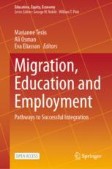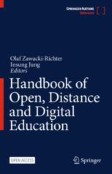Search
Search Results
-
Eye movements in the development of geometric shape recognition: from sensory-motor processes to theoretical perception
Efficient recognition of geometric shapes is an important aspect of proficiency in geometry. Building theoretically on the cultural-historical...

-
Pentagon or “Five-Angle Shape”? Exploring the Effects of Shape Names on Young Children’s Geometric Shape Knowledge
The present study compared Japanese and U.S. preschool children’s knowledge of geometric shapes. The main goal was to explore if differences in...

-
Pattern-Recognition Processes of First-Grade Students: An Explorative Eye-Tracking Study
Recognizing patterns is an essential skill in early mathematics education. However, first graders often have difficulties with tasks such as...

-
Whose recognition is meaningful in develo** a STEM identity? A preliminary exploration with Thai secondary school students
The likelihood that students pursue careers in science, technology, engineering, and mathematics (STEM) depends on the extent to which they identify...

-
Beyond performance, competence, and recognition: forging a science researcher identity in the context of research training
BackgroundStudying science identity has been useful for understanding students’ continuation in science-related education and career paths. Yet...

-
A Culture of Innovation in Early Childhood Education: Which Factors Shape How Teachers Use Curriculum Innovation?
Curriculum innovation occurs throughout the early childhood education (ECE) sector. This article reports on the results of a survey conducted in...
-
Recognition of Children’s Learning in Educational Research, Policy and Practice: Herbison Invited Lecture, NZARE Annual Conference 2022
For Jean Herbison, learning in her early 20th century childhood world was relatively uncomplicated and predictable. Life was shaped by unambiguous...

-
Potential, Actuality or Vulnerability? The Importance of Recognition in Career Counselling for Newly Arrived Migrants
This article studies the importance of recognition in career guidance counselling for newly arrived migrants. The term “recognition” is used as a...
-
From Hand to Eye: a Meta-Analysis of the Benefit from Handwriting Training in Visual Graph Recognition
Handwriting (HW) training seems to boost recognition of visual graphs and learning to read more than other learning experiences. However, effects...

-
Ghana’s Orthographies Shape Literacy Curriculum Design
We describe some linguistic and orthographic challenges to literacy for 11 large language groups in Ghana: Fante, Akwapɛm Twi, Asante Twi, Nzema,...
-
Co-design and mixed methods evaluation of an interdisciplinary digital resource for undergraduate health profession students to improve the prevention, recognition, and management of delirium in Ireland: a study protocol
BackgroundDelirium is a common symptom of acute illness which is potentially avoidable with early recognition and intervention. Despite being a...
-
Enhancing Student Services: Machine Learning Chatbot Intent Recognition for High School Inquiries
Purpose - This paper aims to develop a novel chatbot to improve student services in high school by transferring students’ enquiries to a particular...
-
Quantitative Analysis of Student Emotion Based on Face Recognition Technology
In order to solve the problem that the classroom learning state is difficult to quantify and evaluate, a quantitative analysis method of student...
-
The future shape of RE in England’s Catholic schools: an initial appraisal of the Religious Education Directory for England and Wales (2023)
This is an initial appraisal of the Religious Education Directory (RED) which will stipulate the content of Religious Education (RE) in all English...
-
Accreditation and Recognition of Prior Learning in Higher Education
The recognition of prior learning (RPL) can, and does, play an important role in the accreditation of higher institutional learning, thereby...
-
Competing Alternatives: Science and Math Identity Recognition and Credit Accrual in the Trajectory of STEM Major Plans
It is estimated that over a third of college students switch majors at least once (Astorne-Figari & Speer, Economics of Education Review 70:75–93,
2019 ...
-
How narratives about the secondary-tertiary transition shape undergraduate tutors’ sense-making of their teaching
Drawing on the commognitive framework, we construe the secondary-tertiary transition (STT) as a distinctive element in the pedagogical discourses of...
-
Applied Education Futures and the Shape of Things to Come
Skills development across industry and professional sectors is identified as one of the essential drivers of recovery and growth to address the...
-
Identifying core beliefs of an intercultural educator: How polyculturalism and group malleability beliefs shape teachers’ pedagogical thinking and practice
Manifestations of educational inequity in diversifying societies have led to a wide acknowledgement of the need to develop all teachers’ competencies...

